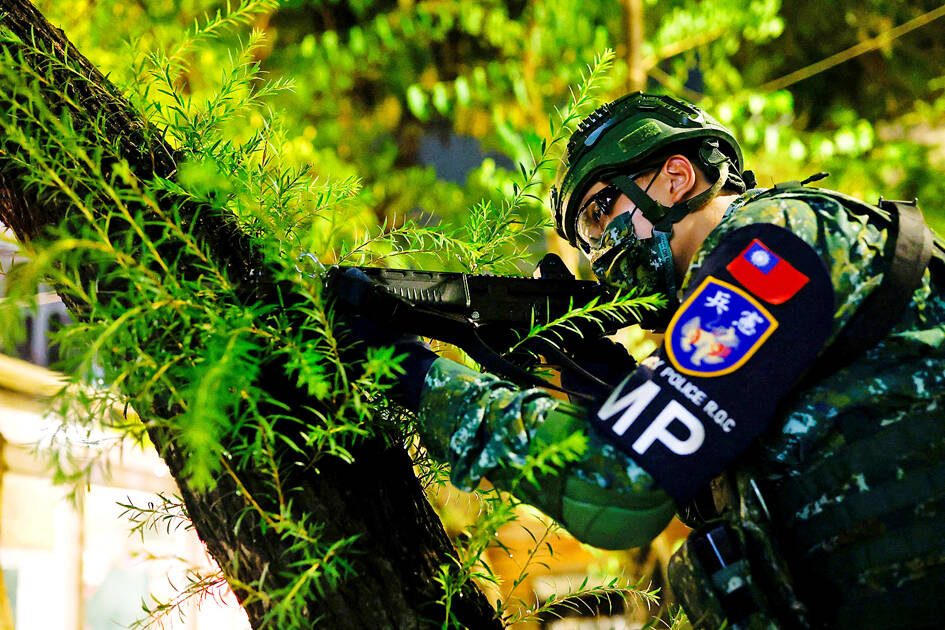National security officials have requested that military police be deployed to guard key infrastructure across the nation, in a bid to protect them from sabotage by sympathizers or supporters of the Chinese Communist Party (CCP) during wartime, also known as “fifth column” activities, military sources said yesterday.
The threat from fifth column units is increasing due to a rise in immigrants, as well as members of organized crime groups being absorbed by the CCP, the sources said.
As they could follow instructions from the CCP to destroy or paralyze Taiwan’s power plants, oil and water storage facilities, communication facilities and science parks, the military police should be dispatched to guard them, because they are better equipped to handle such attacks, they said.

Photo: Ann Wang, Reuters
The Han Kuang military exercises last year included a simulated scenario in which the military police and the railway police worked together to secure Taipei Railway Station after the station master was taken hostage by fifth column members and railway tracks were damaged.
The Military Police Command has expanded its personnel quota to 11,000 after taking into account the infiltration of fifth column units and the potential damage they could do.
Meanwhile, military police training would be designed to bolster their ability to use firearms and defend infrastructure.
Public records show there are at least 5,000 fifth column individuals in Taiwan, Institute for National Defense and Security Research research fellow Su Tzu-yun (蘇紫雲) said when asked for comment.
“Attacks launched by the fifth column or lone wolves are potential threats to Taiwan. So, it is necessary to include armed protection in emergency response plans for key infrastructure,” Su said.
The nation’s key infrastructure is mainly protected by the Second Special Police Corps, Su said.
“The Executive Yuan has identified and classified more than 300 pieces of infrastructure into three security levels. While the Second Special Police [Corps] are tasked to handle threats, the military police would be contacted to offer immediate assistance if there are extenuating circumstances,” he said.
For power plants in coastal areas, the Second Special Police Corps, the Coast Guard Administration and the military police would jointly protect the facilities, Su said.

A strong continental cold air mass is to bring pollutants to Taiwan from tomorrow, the Ministry of Environment said today, as it issued an “orange” air quality alert for most of the country. All of Taiwan except for Hualien and Taitung counties is to be under an “orange” air quality alert tomorrow, indicating air quality that is unhealthy for sensitive groups. In China, areas from Shandong to Shanghai have been enveloped in haze since Saturday, the ministry said in a news release. Yesterday, hourly concentrations of PM2.5 in these areas ranged from 65 to 160 micrograms per cubic meter (mg/m³), and pollutants were

Taiwan’s armed forces have established response protocols for a wide range of sudden contingencies, including the “Wan Chun Plan” to protect the head of state, the Ministry of Defense (MND) said today. After US President Donald Trump on Saturday launched a series of airstrikes in Venezuela and kidnapped Venezuelan President Nicolas Maduro, concerns have been raised as to whether China would launch a similar “decapitation strike” on Taiwan. The armed forces regularly coordinate with relevant agencies and practice drills to ensure preparedness for a wide range of scenarios, Vice Minister of National Defense Hsu Szu-chien (徐斯儉) told reporters before a

EVA Airways on Saturday said that it had suspended a pilot and opened an investigation after he allegedly lost his temper and punched the first officer several times as their plane was taxiing before takeoff at Los Angeles International Airport. According to a report published on Thursday by The Reporter, the incident occurred after the flight’s Malaysian first officer tried to warn the Taiwanese pilot, surnamed Wen (文), that he was taxiing faster than the speed limit of 30 knots (55.6kph). After alerting the pilot several times without response, the first officer manually applied the brakes in accordance with standard operating

NOT AN OPENING: Trump’s violation of international law does not affect China’s consideration in attacking Taiwan; Beijing lacks capability, not precedent, an official said Taiwanese officials see the US’ capture of the president of Venezuela as a powerful deterrent to Beijing’s aggression and a timely reminder of the US’ ability to defeat militaries equipped with Chinese-made weapons. The strikes that toppled Venezuelan President Nicolas Maduro signaled to authoritarian leaders, including Chinese President Xi Jinping (習近平), US President Donald Trump’s willingness to use military might for international affairs core to US interests, one senior official in Taipei’s security circle said. That reassured Taiwan, the person said. Taipei has also dismissed the idea that Trump’s apparent violation of international law could embolden Beijing, said the official, who was not